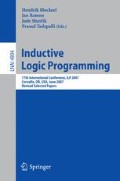Abstract
In reinforcement learning problems, an agent has the task of learning a good or optimal strategy from interaction with his environment. At the start of the learning task, the agent usually has very little information. Therefore, when faced with complex problems that have a large state space, learning a good strategy might be infeasible or too slow to work in practice. One way to overcome this problem, is the use of guidance to supply the agent with traces of “reasonable policies”. However, in a lot of cases it will be hard for the user to supply such a policy. In this paper, we will investigate the use of transfer learning in Relational Reinforcement Learning. The goal of transfer learning is to accelerate learning on a target task after training on a different, but related, source task. More specifically, we introduce an extension of the options framework to the relational setting and show how one can learn skills that can be transferred across similar, but different domains. We present experiments showing the possible benefits of using relational options for transfer learning.
Access this chapter
Tax calculation will be finalised at checkout
Purchases are for personal use only
Preview
Unable to display preview. Download preview PDF.
References
Barto, A., Mahadevan, S.: Recent advances in hierarchical reinforcement learning. Discrete-Event Systems journal 13, 41–77 (2003)
Blockeel, H., De Raedt, L.: Top-down induction of first order logical decision trees. Artificial Intelligence 101(1-2), 285–297 (1998)
Driessens, K., Ramon, J., Blockeel, H.: Speeding up relational reinforcement learning through the use of an incremental first order decision tree learner. In: Flach, P.A., De Raedt, L. (eds.) ECML 2001. LNCS (LNAI), vol. 2167, pp. 97–108. Springer, Heidelberg (2001)
Driessens, K., Ramon, J., Croonenborghs, T.: Transfer learning for reinforcement learning through goal and policy parameterization. In: ICML Workshop on Structural Knowledge Transfer for Machine Learning (Online Proceedings) (2006)
Driessens, K., Dzeroski, S.: Integrating guidance into relational reinforcement learning. Machine Learning 57(3), 271–304 (2004)
Džeroski, S., De Raedt, L., Driessens, K.: Relational reinforcement learning. Machine Learning 43, 7–52 (2001)
Fern, A., Yoon, S., Givan, R.: Approximate policy iteration with a policy language bias: Solving relational Markov decision processes. Journal of Artificial Intelligence Research 25, 85–118 (2006)
Fernández, F., Veloso, M.: Probabilistic policy reuse in a reinforcement learning agent. In: AAMAS ’06: Proceedings of the fifth international joint conference on Autonomous agents and multiagent systems, pp. 720–727. ACM Press, New York (2006)
Konidaris, G., Barto, A.: Building Portable Options: Skill Transfer in Reinforcement Learning. In: Veloso, M. (ed.) Proceedings of the 20th International Joint Conference on Artificial Intelligence, Hyderabad, India, January, 6-12 2007, pp. 2895–900 (2007)
Madden, M.G., Howley, T.: Transfer of Experience Between Reinforcement Learning Environments with Progressive Difficulty. AI. Rev. 21(3-4), 375–398 (2004)
Perkins, T.J., Precup, D.: Using Options for Knowledge Transfer in Reinforcement Learning. In: Technical Report UM-CS-1999-034, University of Massachusetts, MA, USA (1999)
Sutton, R., Barto, A.: Reinforcement Learning: An Introduction. The MIT Press, Cambridge, MA (1998)
Sutton, R., Precup, D., Singh, S.: Between mdps and semi-mdps: A framework for temporal abstraction in reinforcement learning. Artificial Intelligence 112, 181–211 (1999)
Tadepalli, P., Givan, R., Driessens, K.: Relational reinforcement learning: An overview. In: Proceedings of the ICML 2004 Workshop on Relational Reinforcement Learning (2004)
Torrey, L., Shavlik, J., Walker, T., Maclin, R.: Skill acquisition via transfer learning and advice taking. In: Proceedings of the 17th European Conference on Machine Learning, pp. 425–436 (2006)
Author information
Authors and Affiliations
Editor information
Rights and permissions
Copyright information
© 2008 Springer-Verlag Berlin Heidelberg
About this paper
Cite this paper
Croonenborghs, T., Driessens, K., Bruynooghe, M. (2008). Learning Relational Options for Inductive Transfer in Relational Reinforcement Learning. In: Blockeel, H., Ramon, J., Shavlik, J., Tadepalli, P. (eds) Inductive Logic Programming. ILP 2007. Lecture Notes in Computer Science(), vol 4894. Springer, Berlin, Heidelberg. https://doi.org/10.1007/978-3-540-78469-2_12
Download citation
DOI: https://doi.org/10.1007/978-3-540-78469-2_12
Publisher Name: Springer, Berlin, Heidelberg
Print ISBN: 978-3-540-78468-5
Online ISBN: 978-3-540-78469-2
eBook Packages: Computer ScienceComputer Science (R0)

